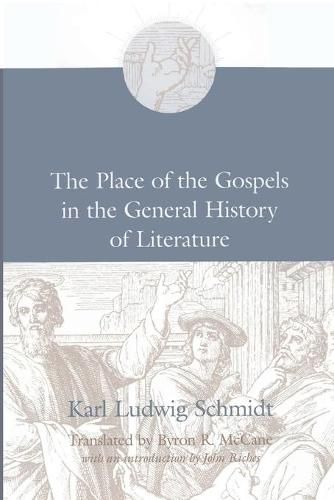Readings Newsletter
Become a Readings Member to make your shopping experience even easier.
Sign in or sign up for free!
You’re not far away from qualifying for FREE standard shipping within Australia
You’ve qualified for FREE standard shipping within Australia
The cart is loading…






This title is printed to order. This book may have been self-published. If so, we cannot guarantee the quality of the content. In the main most books will have gone through the editing process however some may not. We therefore suggest that you be aware of this before ordering this book. If in doubt check either the author or publisher’s details as we are unable to accept any returns unless they are faulty. Please contact us if you have any questions.
Karl Ludwig Schmidt’s classic Die Stellung der Evangelien der allgemeinen Literaturgeschichte was one of a handful of twentieth-century essays on the New Testament to set the agenda for an entire generation of New Testament scholars. First published in 1923, the text laid out Schmidt’s contention that the gospels represent a literary genre that does not derive from others in the ancient world. In portraying the gospels as the written record of an oral tradition rather than as biographical or historical text, the German scholar found points of comparison with Sayings of the Desert Fathers and the later collections of Faust legends. Schmidt’s powerful argument has commanded attention in Germany for decades but has never before been fully available in English. In recent years the question of gospel genre has reemerged as an issue of debate. With this translation, Byron R. McCane enables a new generation of English-speaking scholars to engage with Schmidt’s classic perspective on an enduring question. In an introduction to the volume, John Riches places Schmidt’s landmark study in its context. He locates the text among the writings of the form critics, with whom Schmidt allied himself, and relates it to Schmidt’s own still untranslated study of the topography and chronology of the gospels. He documents the essay’s reception in the English-speaking world and critically examines the way Schmidt is understood in present-day discussion of the genre of the gospels. Riches also explores how recent efforts to classify the gospels as ancient biographies have in many ways misread and misrepresented Schmidt’s views - errors that this translation will help rectify.
$9.00 standard shipping within Australia
FREE standard shipping within Australia for orders over $100.00
Express & International shipping calculated at checkout
This title is printed to order. This book may have been self-published. If so, we cannot guarantee the quality of the content. In the main most books will have gone through the editing process however some may not. We therefore suggest that you be aware of this before ordering this book. If in doubt check either the author or publisher’s details as we are unable to accept any returns unless they are faulty. Please contact us if you have any questions.
Karl Ludwig Schmidt’s classic Die Stellung der Evangelien der allgemeinen Literaturgeschichte was one of a handful of twentieth-century essays on the New Testament to set the agenda for an entire generation of New Testament scholars. First published in 1923, the text laid out Schmidt’s contention that the gospels represent a literary genre that does not derive from others in the ancient world. In portraying the gospels as the written record of an oral tradition rather than as biographical or historical text, the German scholar found points of comparison with Sayings of the Desert Fathers and the later collections of Faust legends. Schmidt’s powerful argument has commanded attention in Germany for decades but has never before been fully available in English. In recent years the question of gospel genre has reemerged as an issue of debate. With this translation, Byron R. McCane enables a new generation of English-speaking scholars to engage with Schmidt’s classic perspective on an enduring question. In an introduction to the volume, John Riches places Schmidt’s landmark study in its context. He locates the text among the writings of the form critics, with whom Schmidt allied himself, and relates it to Schmidt’s own still untranslated study of the topography and chronology of the gospels. He documents the essay’s reception in the English-speaking world and critically examines the way Schmidt is understood in present-day discussion of the genre of the gospels. Riches also explores how recent efforts to classify the gospels as ancient biographies have in many ways misread and misrepresented Schmidt’s views - errors that this translation will help rectify.